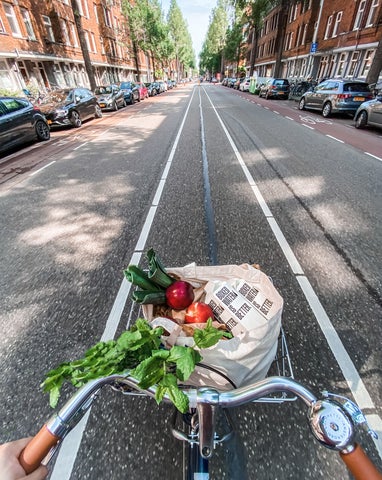How to Grab Meat-Eaters' Attention When You're a Vegan CPG
Vegan consumer packaged goods (CPGs) are no longer just for vegans. In fact, if you were to market your vegan products solely to this consumer niche, you’d be missing out on a huge market opportunity.
Cutting down on meat consumption has officially entered the mainstream. There are now many popular reasons why more people are giving up meat, or at least reducing their intake.

Why the big change?
Americans name health as the biggest motivator for making the change, followed by the environment, food safety, animal welfare and lastly, convenience.
An eye-opening 2020 documentary by David Attenborough spurred many to switch to a plant-based diet due to the unsustainability of the world’s meat consumption. The outbreak of the COVID-19 pandemic also resulted in 43% of Americans eating less meat, aspiring to make ‘positive changes’ and eat healthier.
Those who continue to eat some meat while actively reducing their intake are often referred to as ‘flexitarians’.
Keep flexitarians in your sight
Targeting your vegan product to this ever-growing flexitarian market will expand your customer base and present greater revenue potential. With Veganuary not too far away, it’s a great time to start thinking about how you can grab the attention of those giving it a try for the first time.
Marketing to this demographic is a newer phenomenon than that of vegans or even vegetarians, so it’s important to do your research to get it right.
You wouldn’t want to come across as preachy, or mistakenly oversell the ‘vegan’ aspect of your product - scaring off those who still want to eat animal products every now and then.
How to market vegan products to meat-eaters
Here’s your guide for effectively marketing your vegan or plant-based products to meat-lovers.
Warning - it could bring your business a lot of growth potential and success!
Call yourself ‘plant-based’ instead of ‘vegan’
Words are powerful. Just one word can bring a far deeper meaning, so when it comes to your brand and product, you’ll need to choose your terminology wisely.
The term ‘vegan’ has been around since 1944, while ‘plant-based’ came into use in the 1980s. Although similar in meaning, they do have important differences. We’ve delved into the nuances of the terms in a previous article, so if you haven’t already, make sure to read up on it.
Consumers tend to perceive ‘vegan’ as a stricter label, which doesn’t permit those who call themselves vegan to consume animal products or byproducts. This usually goes beyond diets to incorporate lifestyle choices too.
Don’t isolate non-vegans
While a meat-eater is of course permitted to eat vegan products, they may feel that such products are reserved specifically for vegans and therefore choose to look elsewhere.
Research from John Hopkins even found that labelling a product as ‘vegan’ can cause a major 70% loss in sales.
‘Plant-based’ on the other hand, is typically thought of as a more positive term which welcomes meat eaters and vegans to sample the product. It doesn’t imply to whoever is consuming their product that they have to give up meat or anything else, they’re just choosing to 一 in that moment 一 eat a product that isn’t meat (or dairy).
This one term change can transform your product from an inaccessible, niche product into one that is much friendlier and more approachable.
Avoid packaging cues that suggest ‘free-from’
While your product may be ‘free-from’ meat, dairy, egg, gluten or more, overemphasizing this on the packaging may turn off the mainstream consumer.
Being ‘free-from’ or ‘reduced’ would indicate that your customer is missing out on something, as if the good part has been removed to create a lesser-than product. Even the term ‘healthy’ may deter consumers who would then assume that the product has a lack of flavor, or believe that it may not be filling.
Tempt potential customers
Instead, draw the shopper in with words and imagery that will appeal to their appetites. They’ll still recognize the health benefits or natural aspects of your product with a quick glance at the vegan or plant-based certified labels, among other subtle packaging attributes.
Think of it this way - you’re not trying to convince anyone to ‘give up’ anything, so don’t suggest that on your packaging. Instead, you’re offering them a delicious food or beverage product that will appeal to them just as much as other options.
For a deeper dive into plant-based packaging, head on over to this article.
Once you’ve peaked their interests, they’ll then go on to read all about how healthy your product is and how it doesn’t contain any nasties or animal products.
Use fun, punny names
While dads are officially banned from using puns around the dinner table, CPGs are actively encouraged to do so.
Take for example Honestly Tasty’s ‘Shamembert’. The product is a dairy-free alternative to the beloved camembert cheese. Its name is a play on the term ‘sham’ 一 which is literally defined as ‘something that is not what it seems to be’ 一 and ‘camembert’ 一 the traditional dairy product.
With this simple, funny name, consumers understand that they’re buying a product that is like camembert - but it’s not.
It’s the vegan alternative.
Had they called the product ‘vegan camembert’, it’s unlikely to have seen the same levels of popularity and market uptake. Vegan cheese is infamous for not matching up to the real thing in both taste and texture.
So rather than putting people off, they used a punny name to communicate that it’s vegan, without actually having to say it. Genius!
Sell in the health benefits
As mentioned above, most people are cutting down on meat for health reasons. Boasting the health benefits of your CPG product on the packaging would be a surefire way to grab the attention of those consumers.
If your product is packing in certain vitamins or minerals, let them know! This is a much more consumer-friendly way of promoting the health aspects of your products than, for instance, ‘low fat’, or ‘sugar free’ labels.
Telling them about what they’re getting is way more appealing than telling them what they’re not getting.
Another way to market your health benefits is to discuss the effects that your product can have. Let’s say your plant-based product is packing in Vitamin B12, if you were to put it front and center of your packaging, it might fly right over people’s heads.
On the other hand, if you discussed how it could make them feel more energetic and focused, that might convince people to pick it up from the shelf.
Highlight your sustainability efforts
Second on the list of popular reasons to give up meat was environmental reasons.
You could mention how your product releases less CO2, consumes less water or uses less plastic. Again, it doesn’t have to be the main selling point, this could be the cherry on top that encourages a consumer to pop your item into their baskets.
Perhaps you’ve got easy-to-recycle packaging or you use renewable energy resources to power your manufacturing process. Whatever it is, it probably deserves a mention.
Get your product near the meat, not away with the ‘free-from’
While you now know not to plaster ‘free-from’ all over your products, you also don’t want them to be too near those that do. Items that are geographically near each other in a store tend to be very similar, so getting yourself into the wrong aisle may have the same negative effects.
You wouldn’t want all of your packaging efforts to go to waste!
The occasional meat-eater will still visit the meat aisle, looking for a tasty, filling piece of meat to enjoy with their dinners. If your meat-alternative product is within this range, close to the meat products that they know and love, they’ll be more likely to notice it and pick it up.
This product placement may even get you noticed by those who aren’t already flexitarians or actively reducing their meat consumption. They may be devout meat-eaters, but if they notice your delicious looking product next to their weekly buys, they might just give your CPG a chance.
Who knows, you might even convert them to flexitarian!
Need help getting your product into the right aisles?
Buffalo Market is the leading distributor of CPGs that are good for the planet and good for people. We specialize in alternative proteins, regenerative agriculture, organic foods or beverages and more!
If this sounds like your brand, we know exactly where to place your product to maximize sales. We know where the conscious consumer shops and have all of the resources to get your products stocked in no time.
Reach out to us to get started!



